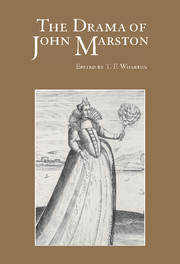Book contents
- Frontmatter
- Contents
- Notes on contributors
- Acknowledgements
- Note on the text
- Introduction
- 1 John Marston at the ‘mart of woe’: the Antonio plays
- 2 John Marston: a theatrical perspective
- 3 Varieties of fantasy in What You Will
- 4 Safety in fiction: Marston's recreational poetics
- 5 Insatiate punning in Marston's courtesan plays
- 6 Touching the self: masturbatory Marston
- 7 ‘Two parts in one’: Marston and masculinity
- 8 The Malcontent: hunting the letter
- 9 The Dutch Courtesan and the profits of translation
- 10 Sexual politics in Marston's The Malcontent
- 11 Marston: censure, censorship, and free speech
- 12 Ill-mannered Marston
- Index
Introduction
Published online by Cambridge University Press: 01 October 2009
- Frontmatter
- Contents
- Notes on contributors
- Acknowledgements
- Note on the text
- Introduction
- 1 John Marston at the ‘mart of woe’: the Antonio plays
- 2 John Marston: a theatrical perspective
- 3 Varieties of fantasy in What You Will
- 4 Safety in fiction: Marston's recreational poetics
- 5 Insatiate punning in Marston's courtesan plays
- 6 Touching the self: masturbatory Marston
- 7 ‘Two parts in one’: Marston and masculinity
- 8 The Malcontent: hunting the letter
- 9 The Dutch Courtesan and the profits of translation
- 10 Sexual politics in Marston's The Malcontent
- 11 Marston: censure, censorship, and free speech
- 12 Ill-mannered Marston
- Index
Summary
It is just four hundred years since Marston embarked on his brief and sensational career as a commercial dramatist for the boys' companies. His first play, Histriomastix (1598) was written, not for a boys' company at all, but for his peers at the Middle Temple, but then, in two brief creative bursts, first for the playhouse at Paul's, then for the Blackfriars, he wrote eight sole-authored plays: for Paul's playhouse, between 1600 (possibly 1599) and 1601, Antonio and Mellida, Jack Drum's Entertainment, Antonio's Revenge, and What You Will; for the Blackfriars, between 1604 and 1606, The Malcontent, The Dutch Courtesan, The Fawn, and Sophonisba. The silent two- or three- year interim marks Marston's virtual obliteration by Jonson in the ‘War of the Theatres’.
Marston's vigorous participation in a literary war was typical. From the start, it is clear that he intended to be noticed, and the means he instinctively used was aggression. His chosen nickname, ‘Kinsayder’, or ‘castrator's song’, is a kind of pun on his own name (‘Mar-stone’), and the literary stones of others were his targets, initially in verse satire, and subsequently in drama. His means of establishing himself in both genres was by attacking, with almost the first words he wrote, their most recognized practitioners; respectively, Joseph Hall and Ben Jonson. He was ‘ready for trouble’, and prepared to ‘enter the literary lists … in the role of challenger’.
- Type
- Chapter
- Information
- The Drama of John MarstonCritical Re-Visions, pp. 1 - 13Publisher: Cambridge University PressPrint publication year: 2001

